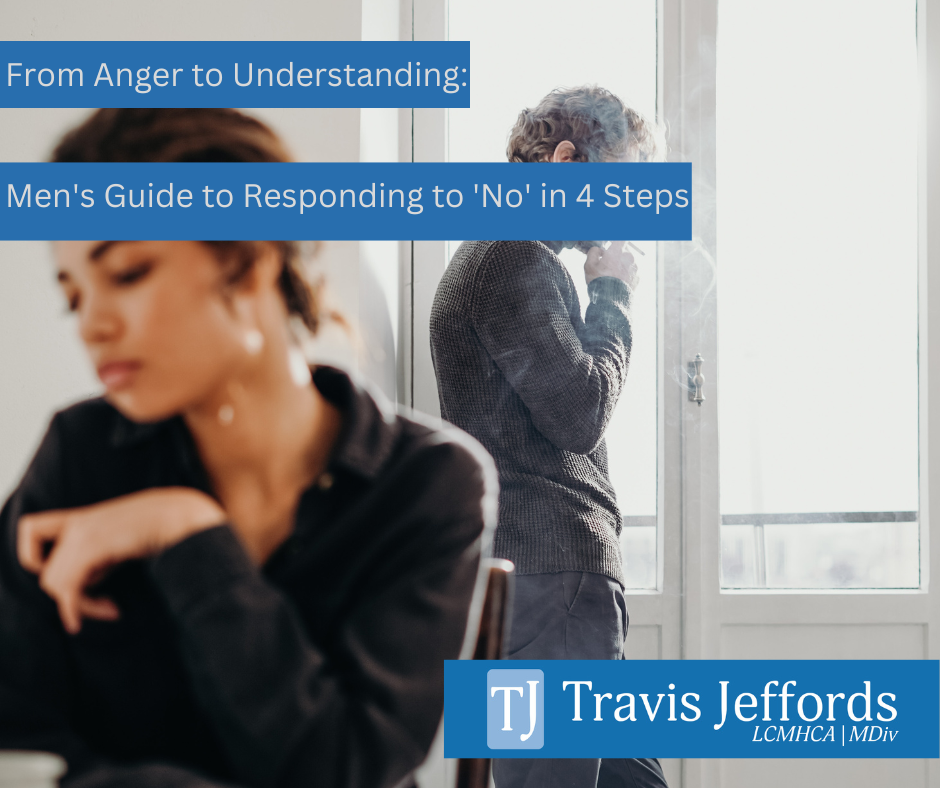Angry at Home, Calm at Work: Men’s Guide to Understanding Emotions
You laugh and crack jokes at work…but when you come home, you are often overcome by anger, frustration, and sometimes even rage.
As a male therapist in Greensboro and Winston-Salem who works with men with anger, I hear this story a lot. It can be really confusing to men. Oftentimes men’s go-to response is that there must be something wrong with their partner or their children, since those are the people they’re getting mad at...
However, when we believe other people are the problem, it can leave us feeling even more frustrated and helpless.
In this article I’m going to give you some straightforward explanations for what’s going on inside - and give you three actions that you can work towards taking right now in order to reduce tension and frustration in your home life and put you back in the driver’s seat.
What Children's Research Has to Tell Us About Men’s Anger at Home
Men aren’t the only ones act calm and appropriately outside the home, and then come home frustrated and angry. Children frequently get caught in this Dr. Jekyll and Mr. Hyde dynamic.
It’s well known that oftentimes kids will excel in one area of their life (home or school), and struggle behavior-wise in the other (home). I’ve talked to numerous dads that are exasperated that their child is getting awards for good behavior at school, and then coming home and completely losing it.
This article on the subject mentions that kids often have to work very hard to be on their best behavior at school. All day they are exerting incredible mental effort to stay in their seats and act appropriately. It’s not always easy for kids! By the time they get home, they can be completely exhausted and drained from having to monitor their own behavior for others so intensely. If ‘acting appropriately’ is a muscle, then after 7 or 8 hours of flexing that muscle and doing heavy lifting, there’s simply nothing left in the home space.
Here’s what one parent says about her daughter:
“She would bottle it up at school, and then basically come off the bus at home and just explode…physically and verbally, she was very upset.”
Helping men recognize their own similarities to their children can be helpful.
Most men can understand and have a sense of compassion for their child’s situation. They may remember having to lock up and push down their emotions in elementary school during the day. They may remember trying really hard just to stay seated at their desk for hours at a time.
The truth is that the work environment often asks for something very similar for men. Depending on what men do for their jobs, men may be required to do tasks they simply don’t want to do for long hours at a time, all while doing it with a smile on their face. Even the best jobs have aspects of them that we’d rather not do, and for some men, that’s actually most of their job.
Simply acknowledging the similarities to men’s roles at work and their children’s roles at school can help create a sense of self-compassion, which can actually reduce their anger and shame.
But what else can men do?
Here are three things to do when you find yourself worn out from the demands in your work environment, and find it spilling out into your home life:
Reducing Anger at Home: Leaning Into Authenticity and Healthy Communication at Work
The roles we have at our jobs expect us to act in certain ways:
A police officer is expected to be stern in their role.
A pastor is expected to be gracious and well-behaved in their role.
A restaurant server is expected to be deferential and always smiling in their role.
A manager is expected to be emotionally contained at all times in their role.
No matter what our job is, we’re asked to put on a mask and act a certain way. It’s not that we don’t naturally have some of those qualities that we are asked to show at work (a police officer may frequently be stern in their life, a pastor may frequently be well-behaved), but those aspects are not all of who we are.
When we’re asked to bottle up and suppress other aspects of ourselves for hours on end, it can tire us out, and lead to us taking out our frustration when we get home from work.
The first thing you can do to reduce your frustration after work, is to reduce your frustration in work, by finding ways to express yourself in more healthy and authentic ways.
For men who are labeled ‘nice guys’, this may be a big stretch at first.
But there’s a positive:
Leaning into healthy authentic expression of your feelings and needs in your work setting can a) lead to you getting some of the things you need in work to reduce your frustration, and b) even if your situation doesn’t change, just the act of expressing yourself more fully can reduce your anger and frustration.
Often men worry that if they start to express themselves, they may not know how to stop! They worry that their feelings are like water in a fire hydrant…if they were to start expressing the emotions inside them, it would all come rushing out in one big powerful spray of water. I totally get that fear. This is where a counselor can help you learn how to understand your emotions and learn how to express them in productive ways.
2. Reducing Anger at Home: Creating Space to Decompress
Sometimes work asks more of you than you have the ability to process or regulate. This can look all kinds of ways:
You’re an introvert and you’re required to be more extroverted at work than is comfortable, it could be you have more responsibility than you are able to easily deal with right now, it could be you have more interpersonal tension than you are able to shrug off…whatever it looks like, sometimes we need ways to release and relieve the tension we accumulate throughout the day.
Here are 7 ideas to help you decompress and destress after work:
Call a friend on your drive home. You can talk about everything that’s bothering you at work, or you could just talk about sports/the weather/music, whatever - connecting with our community is healing.
Drive home mindfully in silence. Sometimes music and podcasts, and even talking to friends are really good at distracting us from what we are actually experiencing inside. If we’re tired or exhausted, sometimes just driving in silence can be a healing experience.
Sit in the driveway for 10-15 minutes before you go inside. For some men, when they open the door to the house they enter a new world of expectations and demands placed on them due to their family situation. Kids to be played with, chores to be done, etc. If it feels like you’re moving from the work domain where demands are placed on you, straight into the home environment where demands are placed on you, it can be helpful just to rest and breathe for 10 minutes before you go inside.
Spend time in the evening with a book. I know. I went there. An actual book. Like it’s 2004. Social media stimulate us…but there’s a real difference between something that stimulates, and something that restores. The right book can restore.
Sit on the porch in nature. Most of us have some sort of access to nature. A front yard or back yard, a bit of greenspace between you and your car in an apartment, a nearby park. It can be restorative to spend 20 minutes in nature, just sitting in silence and quietly noticing what you notice, allowing yourself, and it, to be.
Spend time in intentional breathwork or meditation.
Exercise. Exercise has been shown in study after study to reduce stress, and it can look like all kinds of things. The most important thing is just to move your body in the way that feels right to you.
3. Reducing Anger at Home: Listening to What Larger Change is Necessary
If you are chronically upset when you come home from work, even after improving your ability to communicate at home and work and implementing restorative practices after work, it can be worth asking if a larger change is necessary.
Would a change of job change your anger issues?
Would a change of career change your anger issues?
These are really difficult questions to get clarity about to be honest. Sometimes we can change our job and career only to realize that those weren’t the issues that were causing our anger after all. But sometimes, our anger is trying to guide us towards a change that really could reduce our anger and frustration.
A skilled therapist can help you to sort out what you’re experiencing within and get clear around what next step feels right to you.
Wishing you the best on your mental health journey.
Hi, I’m Travis.
My clients describe me as calm, compassionate, and curious…
You have these qualities inside you at your core too. You just need a little help uncovering them.
If you’re dominated by anger, I get it. I can help you discover who you really are: confident, calm, compassionate, and connected to yourself and others.
Travis Jeffords - LCMHCA | MDiv. | Male Counselor
In-person counselor: Greensboro & Winston-Salem
Virtual counselor: North Carolina
Licensed Counselor
Please note: The information provided in this blog is for general informational purposes only and is not a substitute for professional counseling or therapy. The content presented here is based on my professional knowledge, personal experiences and research, but it should not be considered as a replacement for individualized mental health advice.
Every individual is unique, and the content provided may not be applicable to everyone's specific circumstances. It is important to consult with a licensed mental health professional regarding your specific concerns and to receive personalized guidance tailored to your needs.













